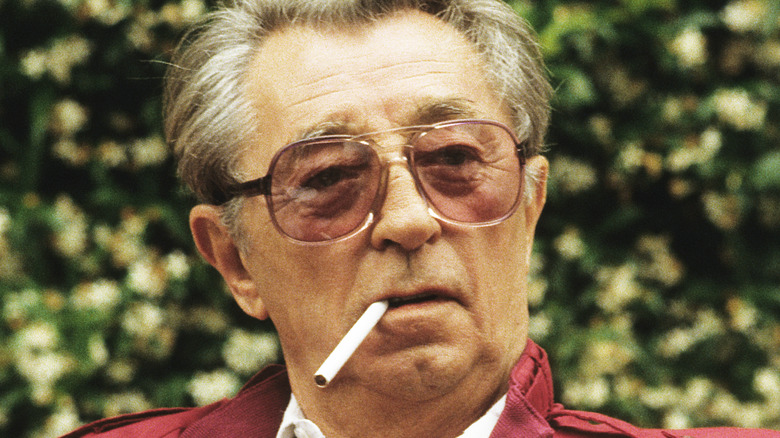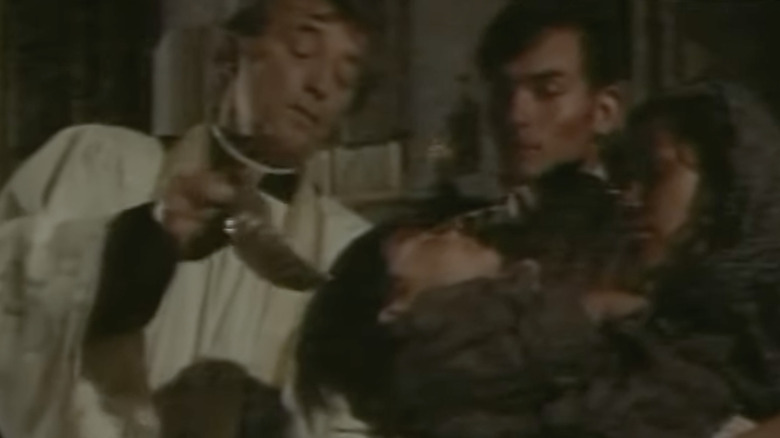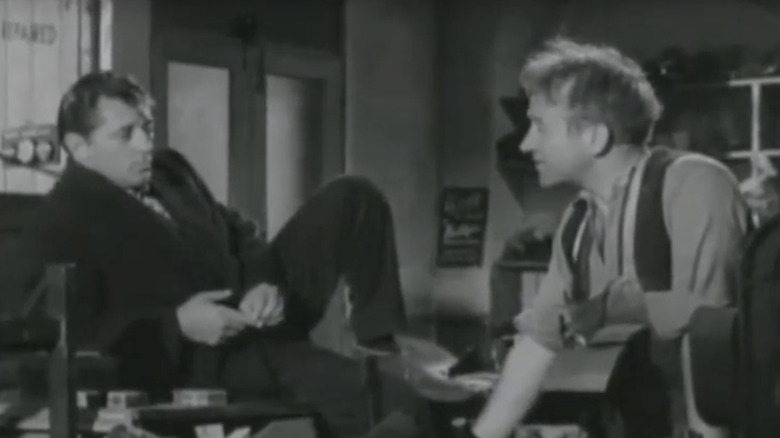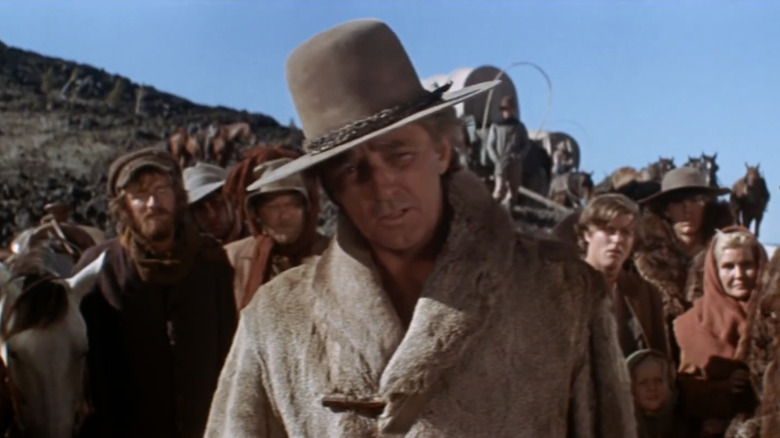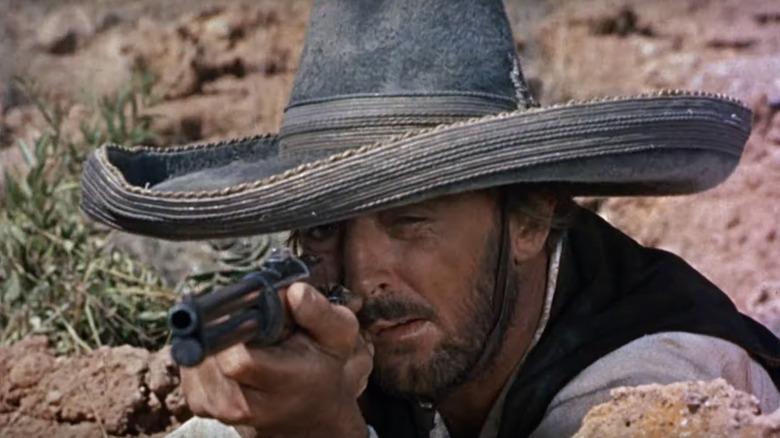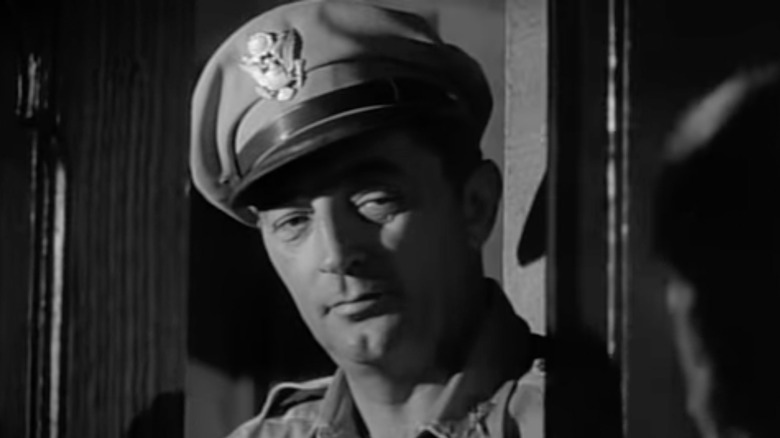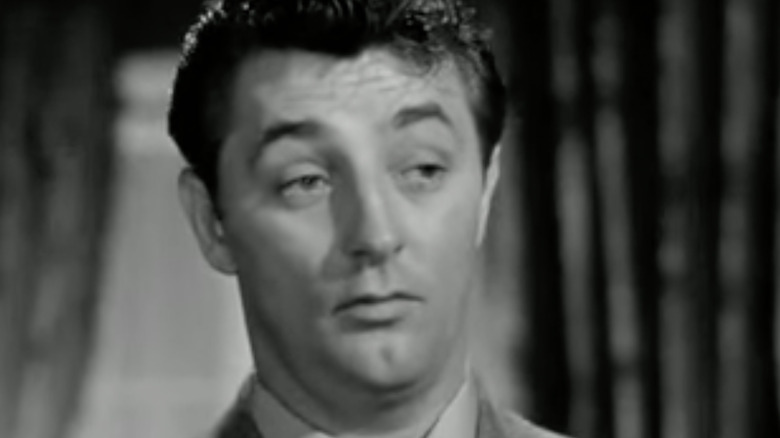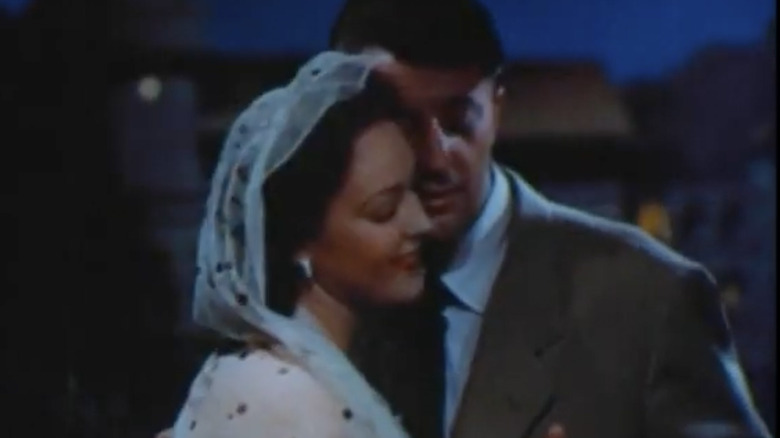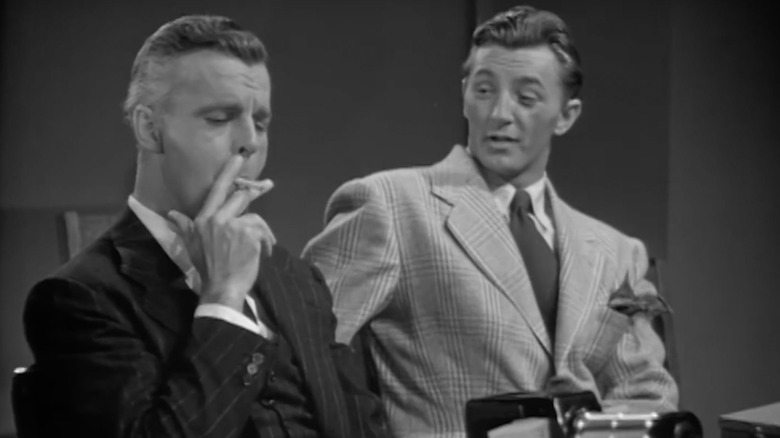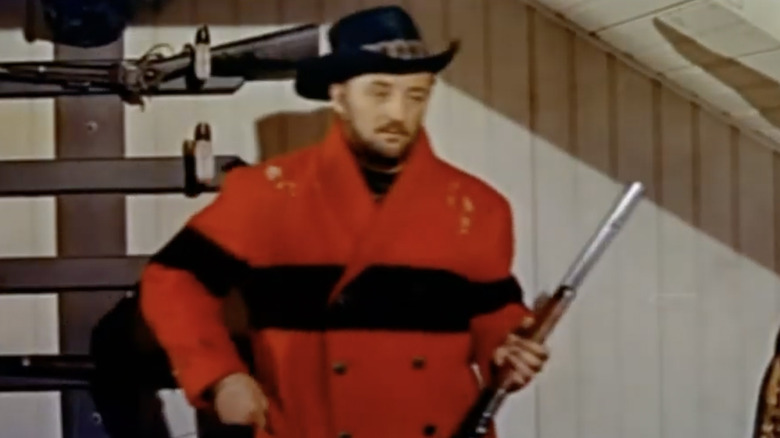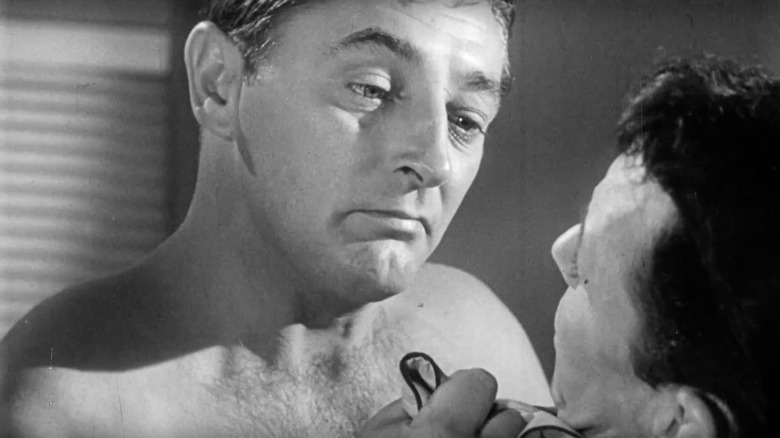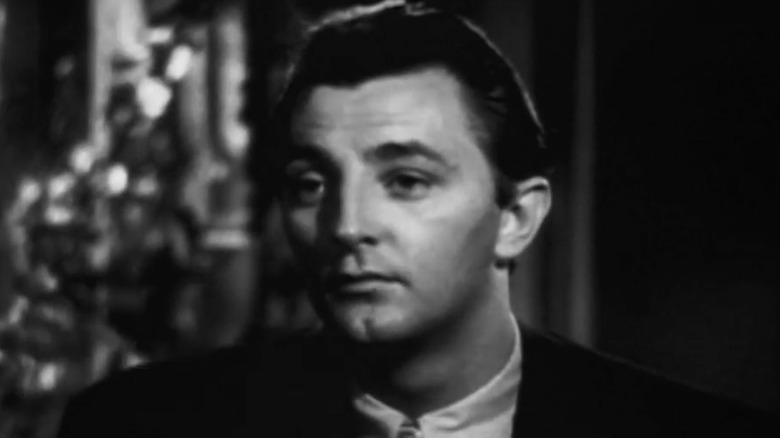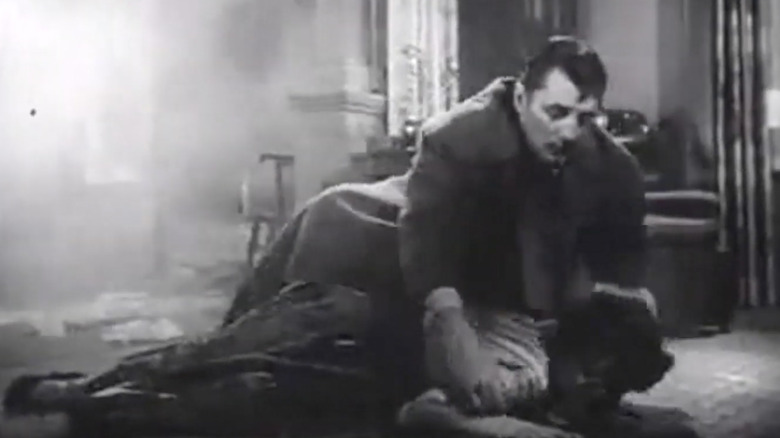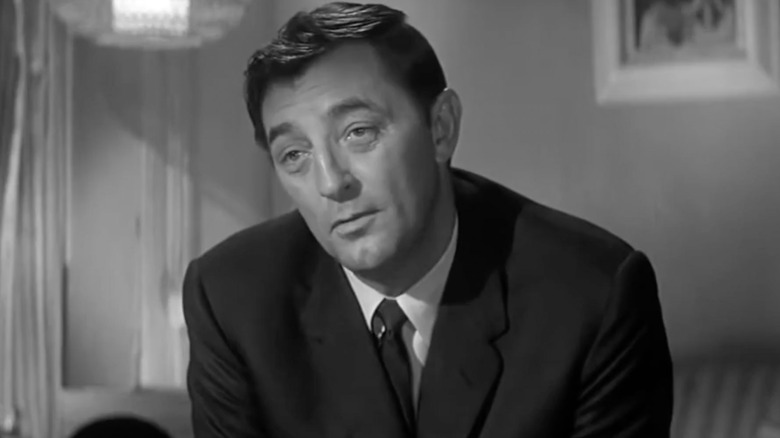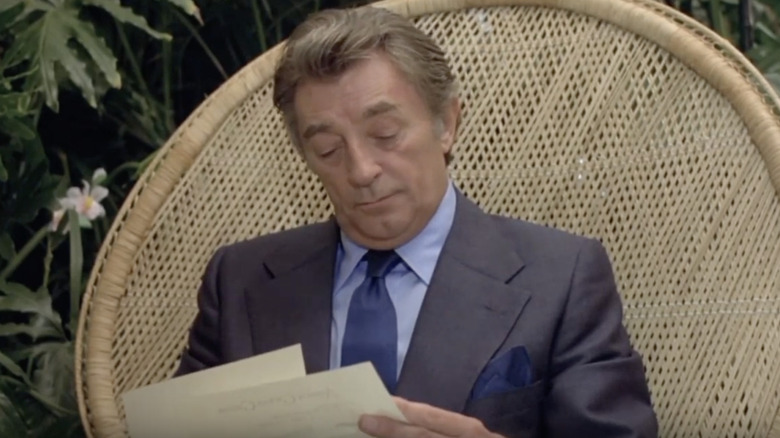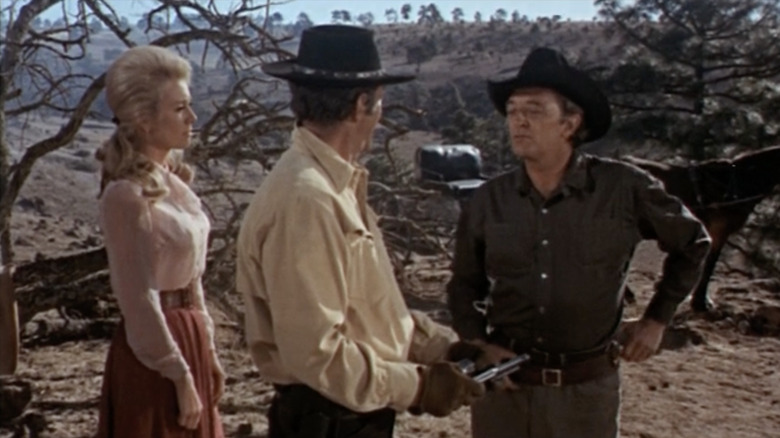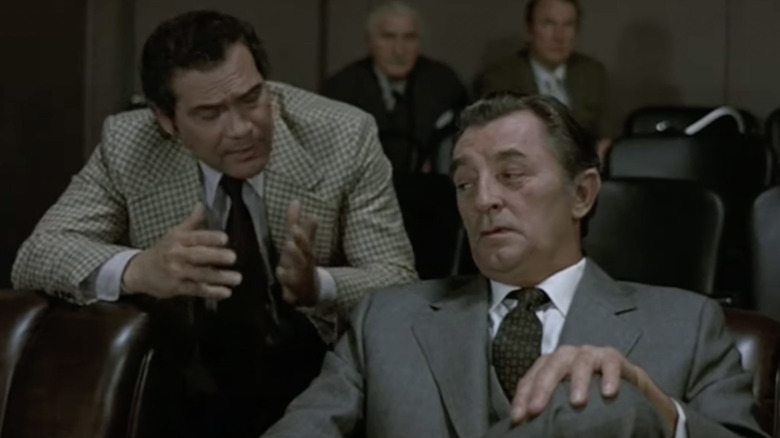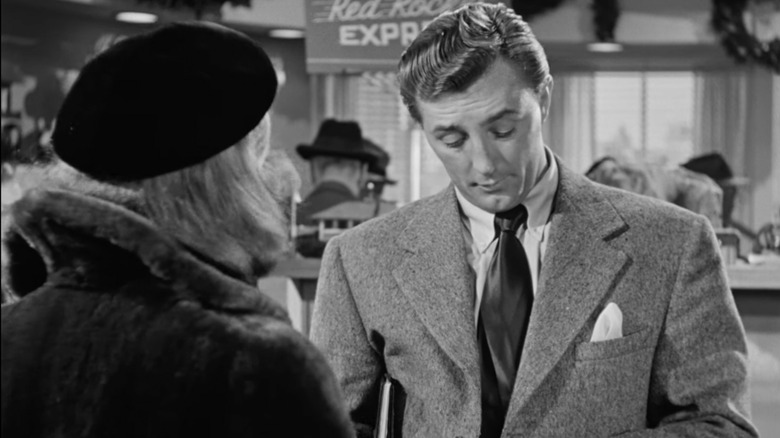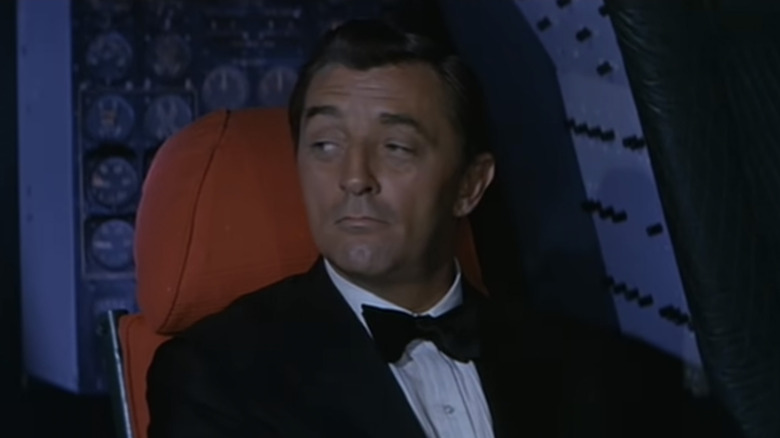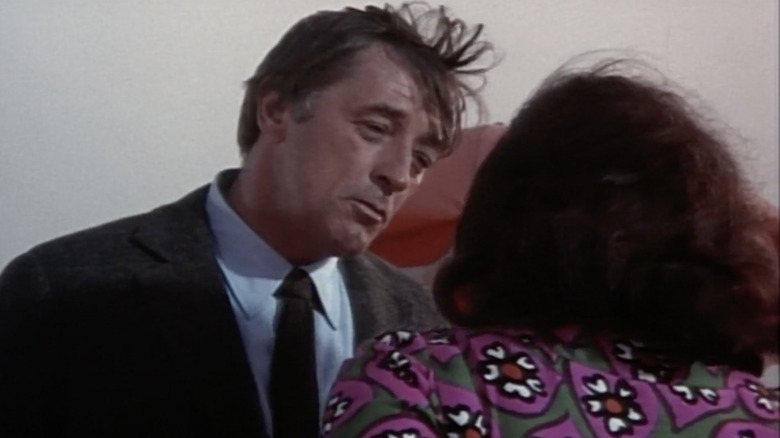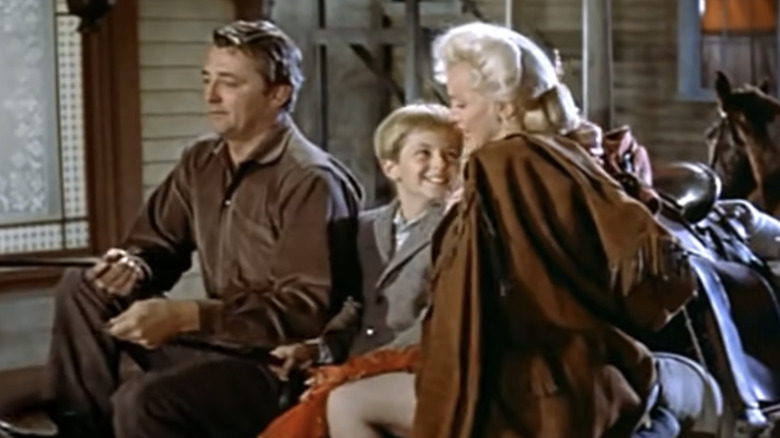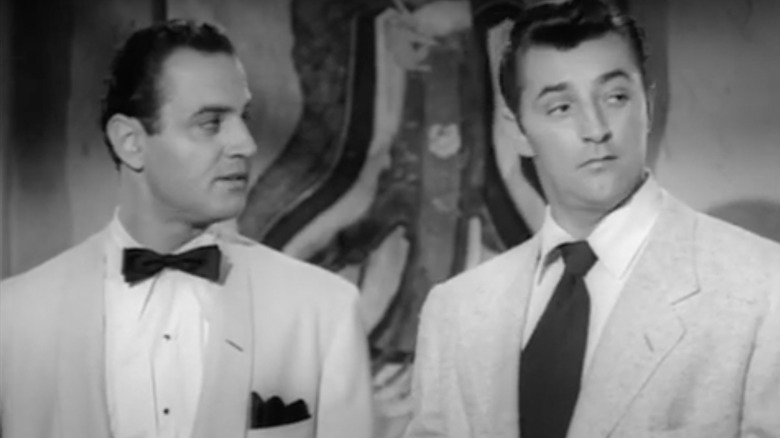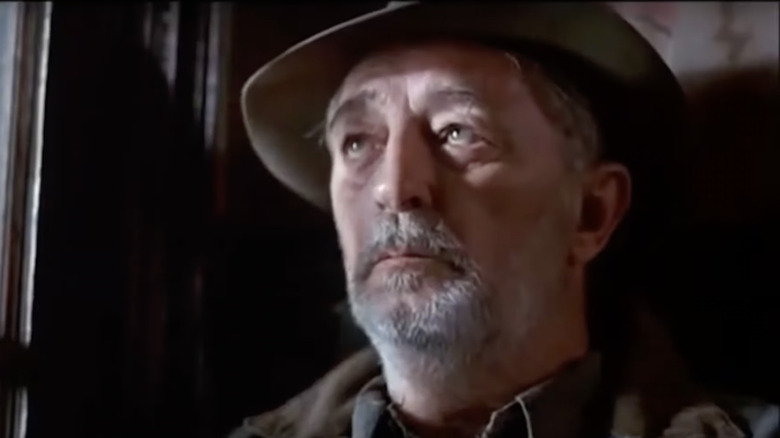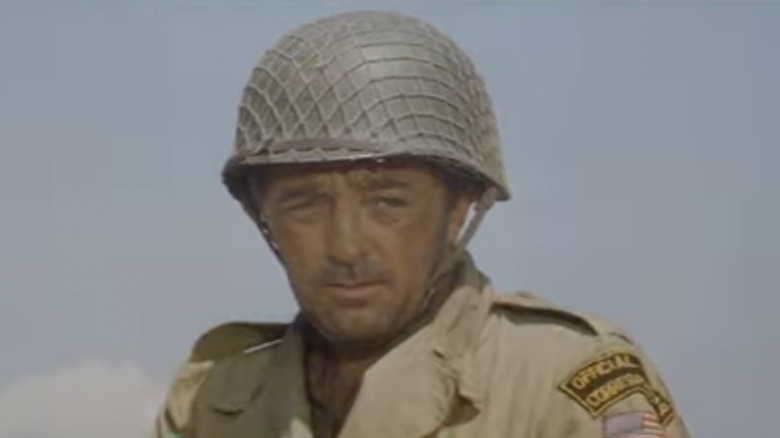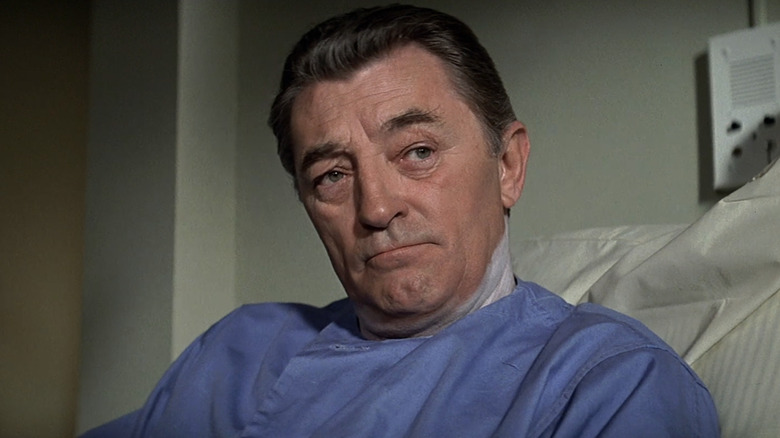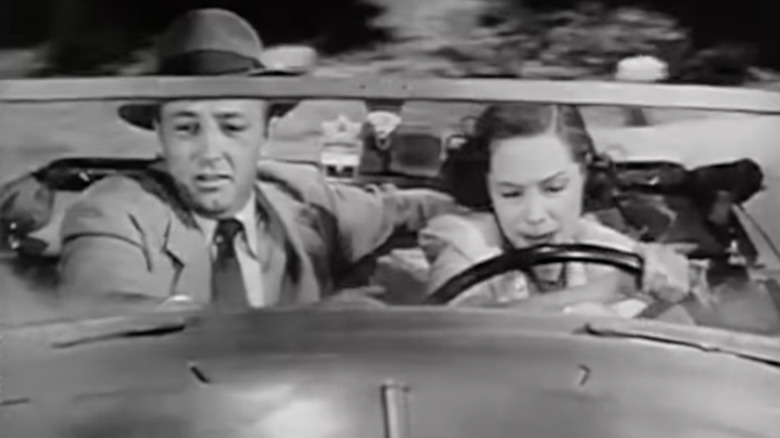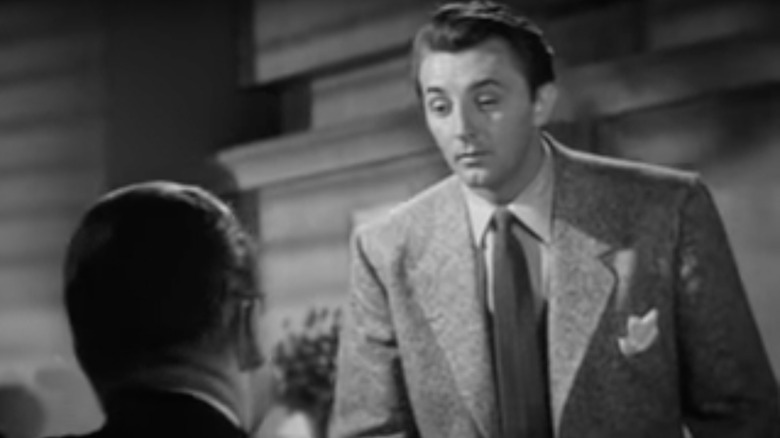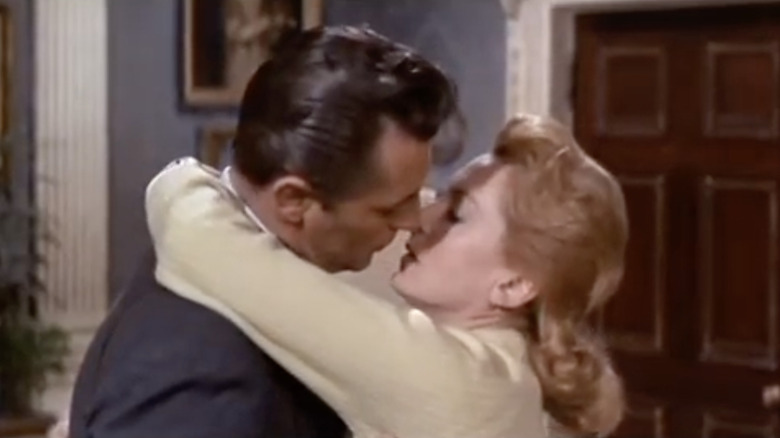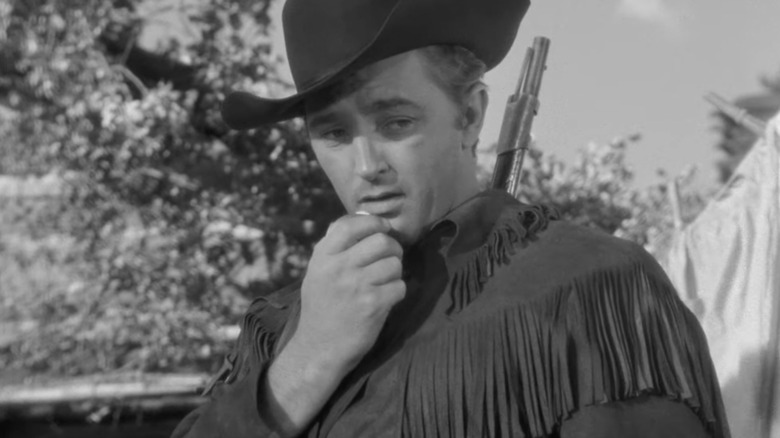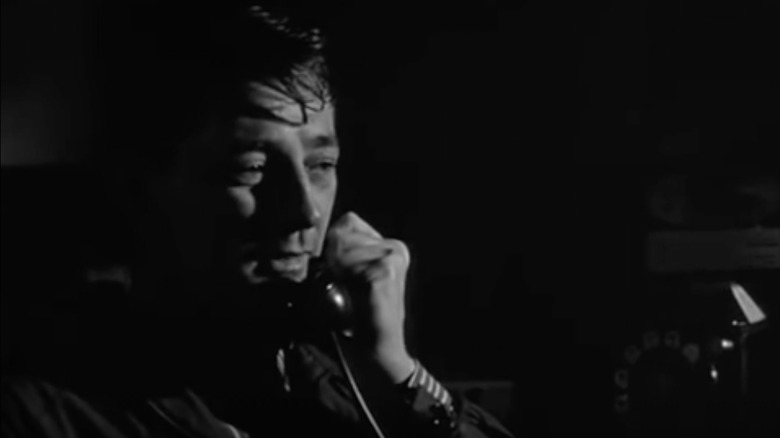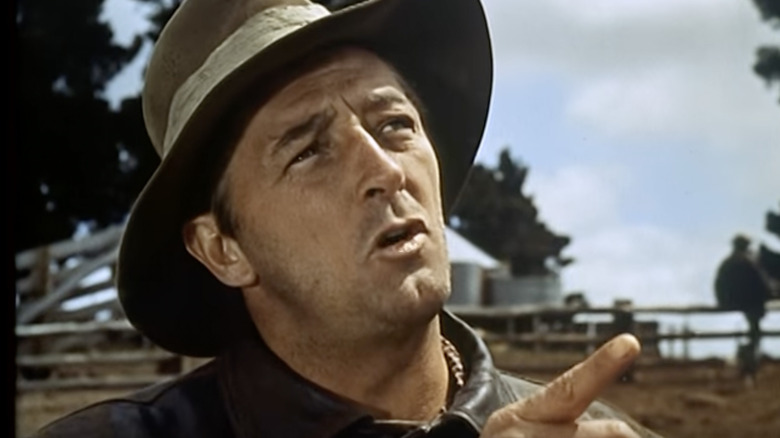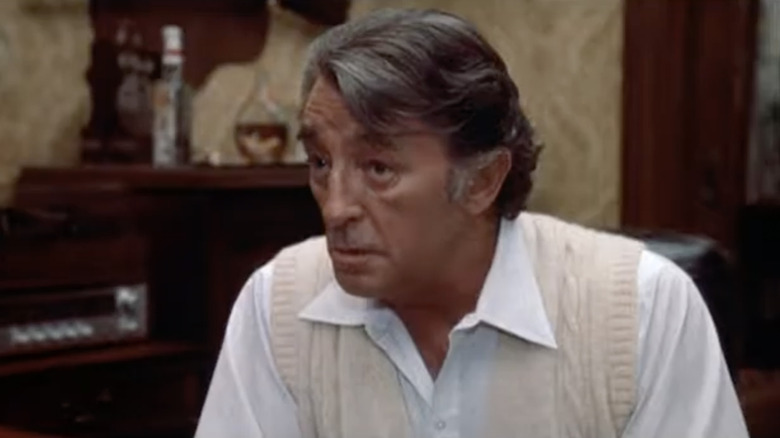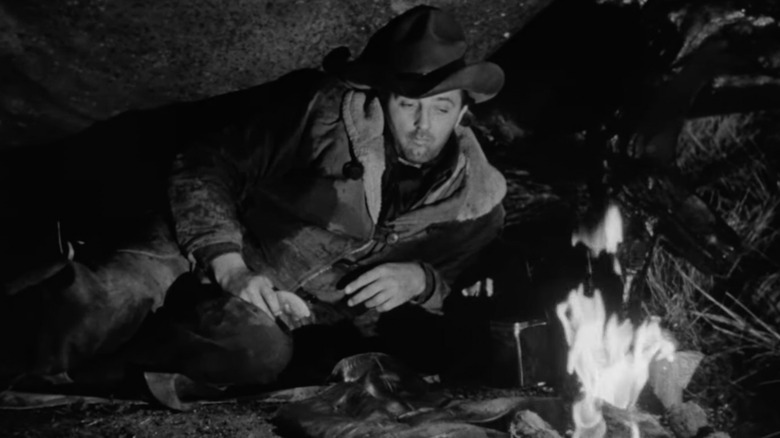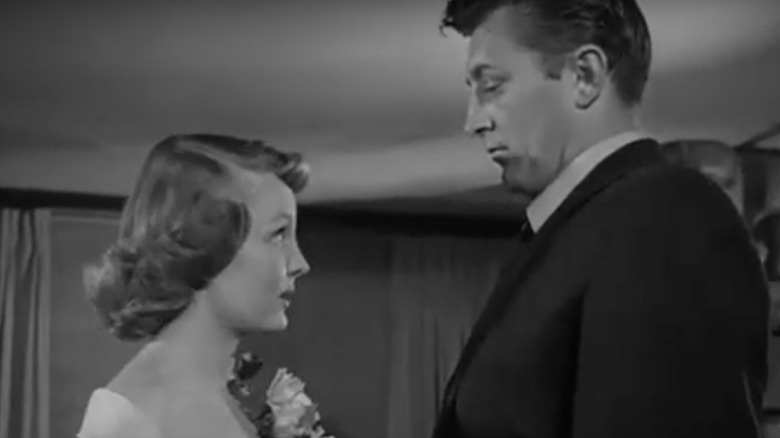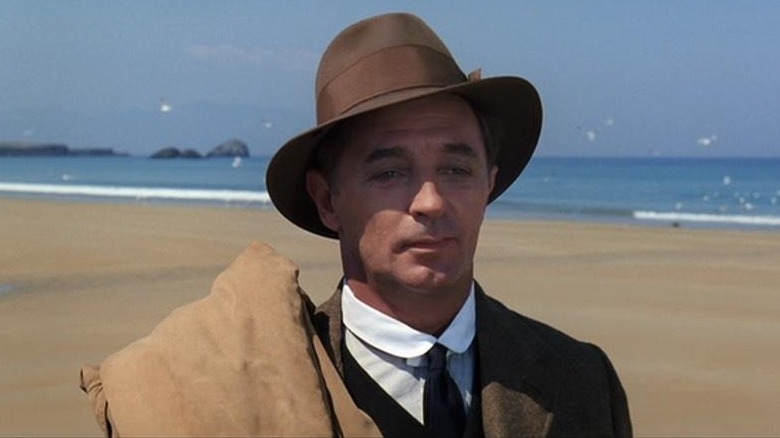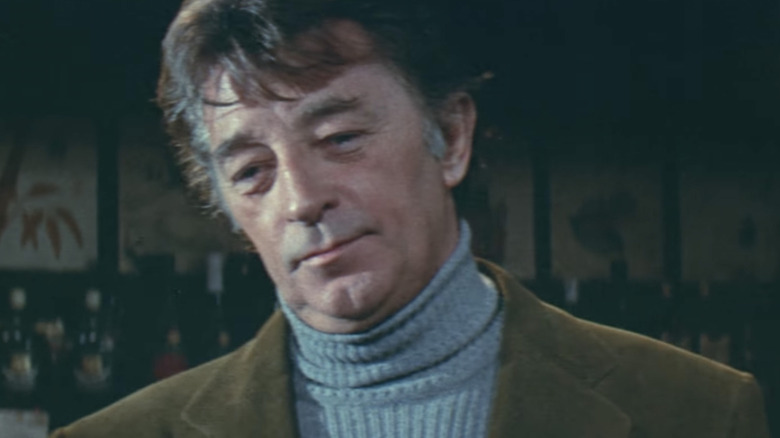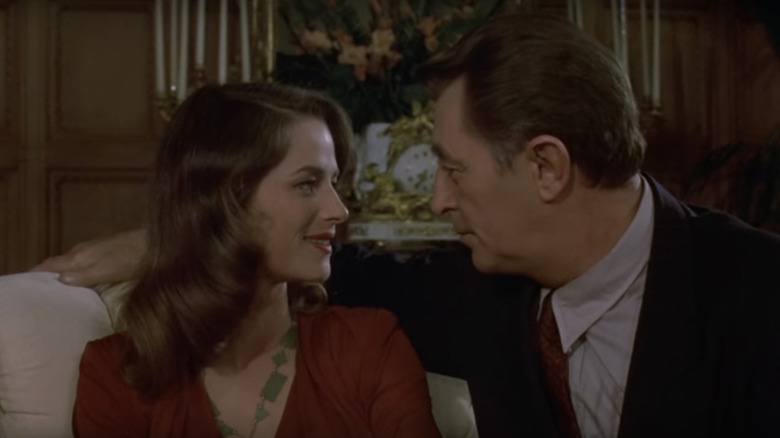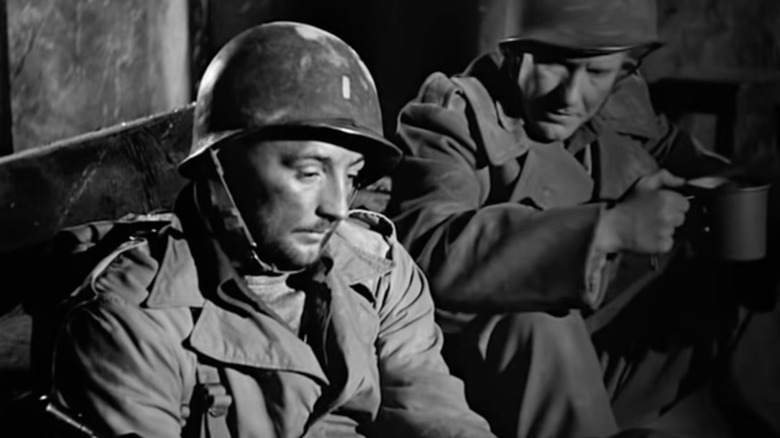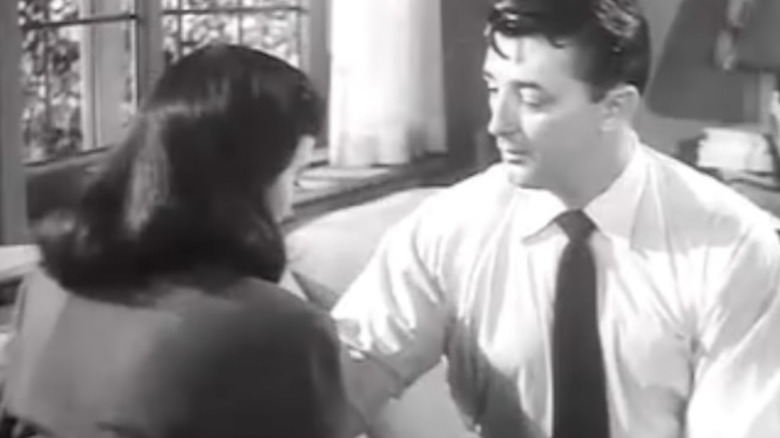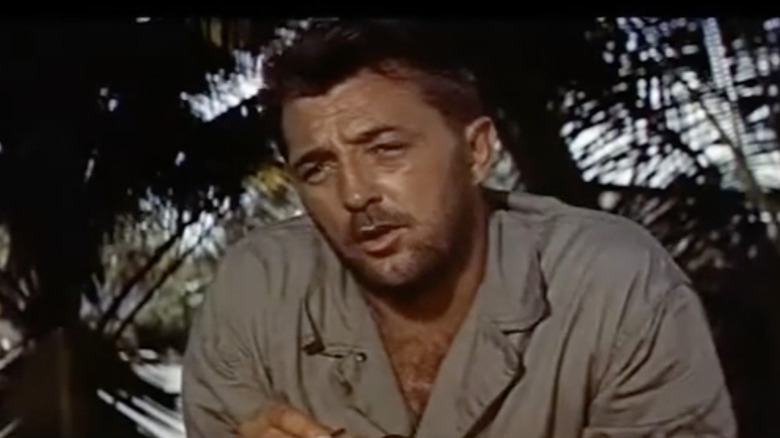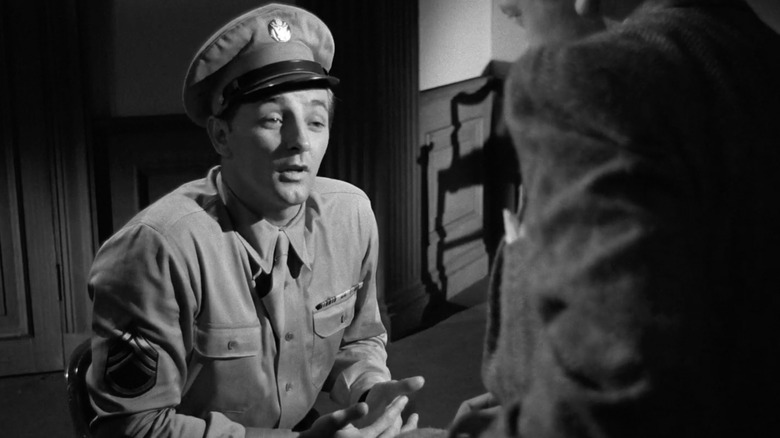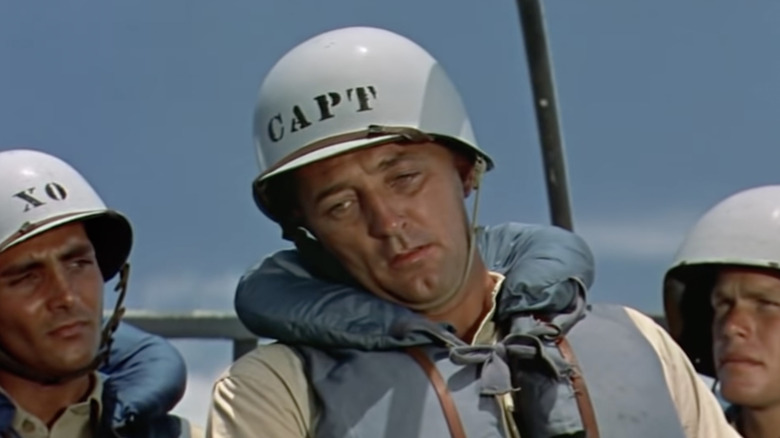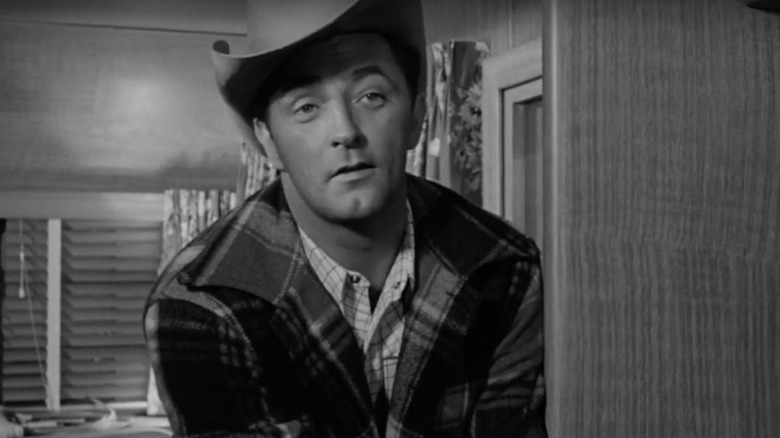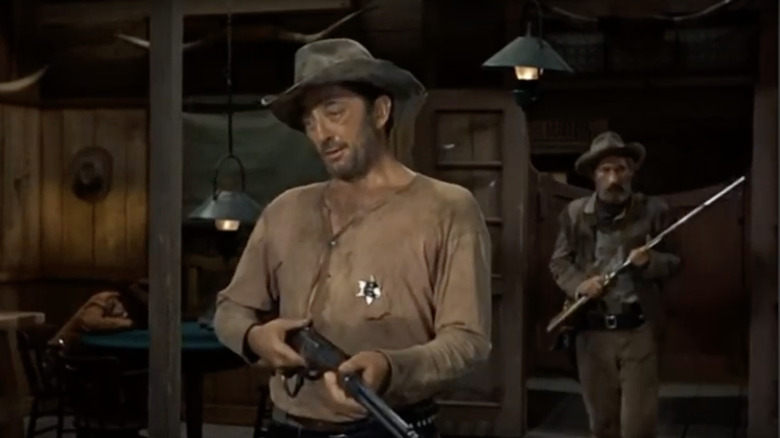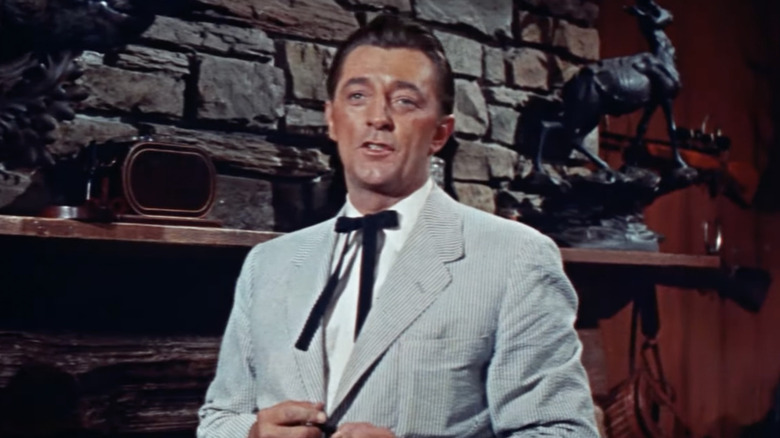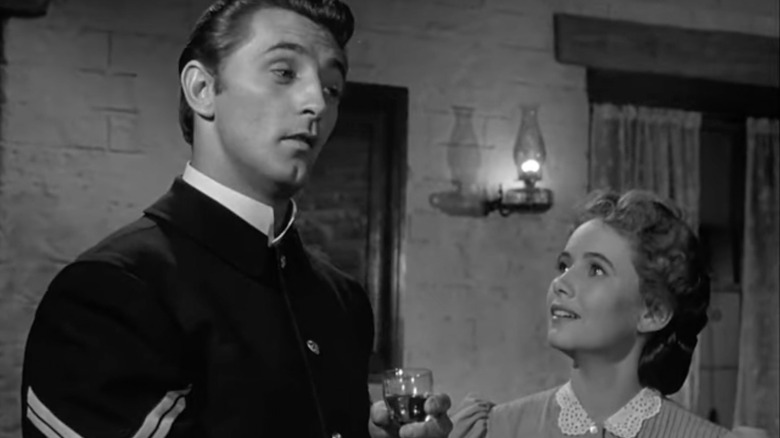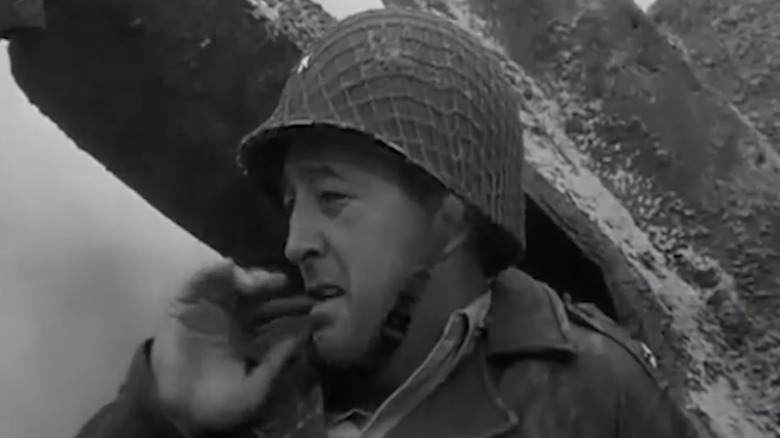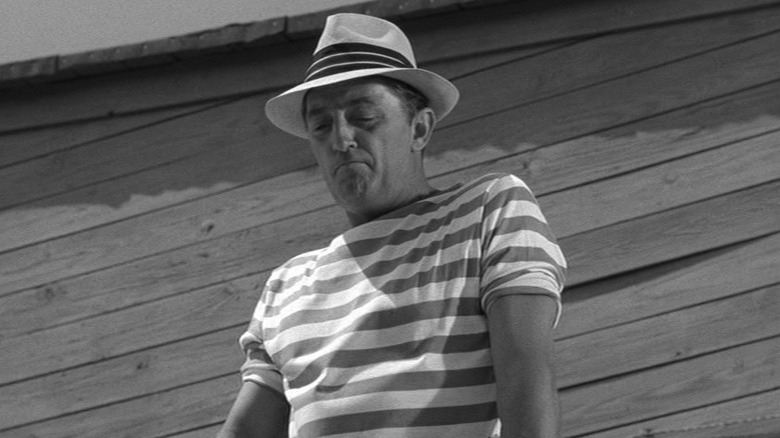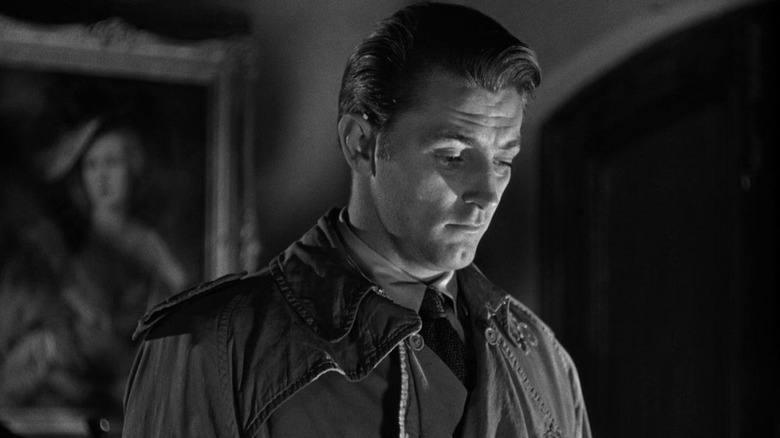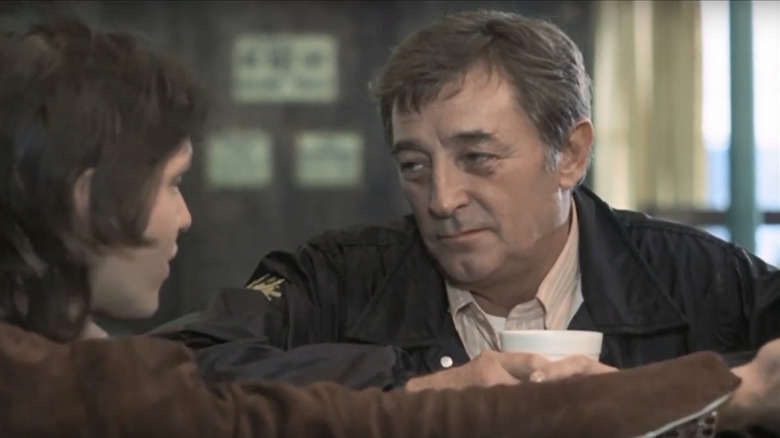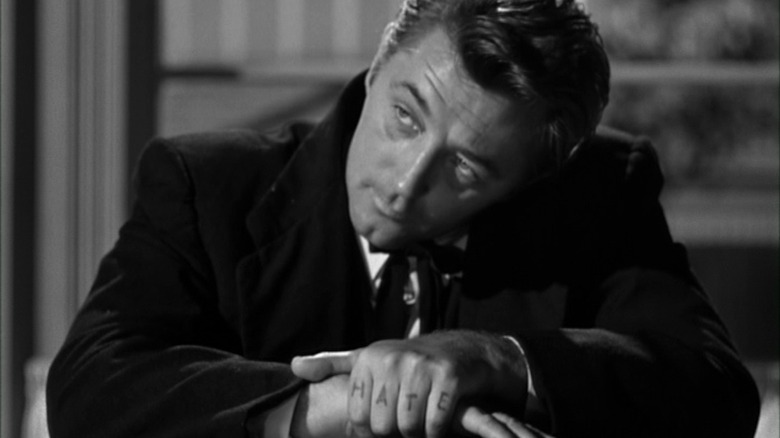50 Most Memorable Robert Mitchum Movies Ranked Worst To Best
Robert Mitchum was one of the greatest actors of his era, capable of effortlessly blurring the line between movie star and character actor. Sleepy-eyed, laconic, and powerfully charismatic, his off-kilter screen presence remains impressively unique. It's hard to think of anyone else as a "Robert Mitchum type": Mitchum stood — and still stands — alone.
Arguably, Hollywood never quite knew what to do with this singularity. Mitchum had a long and busy career filled with plenty of highlights, but only a few roles truly feel tailored to his strengths. Moreover, most of the material he was given was good, rather than great. Yet in many ways, this only highlights his talent: With just a few genuinely iconic credits to his name, Mitchum still managed to achieve cinematic immortality.
Once you start a deep dive into Mitchum's filmography, you quickly find that while he didn't always get top-tier movies, he often got interesting ones. He worked extensively in film noir, Westerns, and war movies, and very few of them are routine. His good projects tend to be either eccentric delights that suit his unique style, or beautifully executed classics that helped define their genres. Not a bad legacy, all things considered, and one well worth exploring. In celebration of this unforgettable actor, we're ranking the 50 most memorable Robert Mitchum movies from worst to best.
50. The Wrath of God
The 1972 Western "The Wrath of God" comes close to having more plot holes than actual plot. In an unknown country, well-armed and enigmatic Father Van Horne (Robert Mitchum), Irish loyalist Emmet Keogh (Ken Hutchison), and English smuggler Jennings (Victor Buono) are all set to be executed. They get an unexpected reprieve when a local colonel hires them to assassinate the murderous kingpin Tomas de la Plata (Frank Langella), whose fanatical hatred of priests immediately puts a target on Van Horne's back. Setting Van Horne up as bait might lure de la Plata out into the open, but he has a small army behind him. No matter what, the odds are against our would-be assassins.
This lopsided film is loaded with clichés and bafflingly unanswered questions. And yet, "The Wrath of God" still entertains. Sometimes, all you want to see are some shoot-outs on dusty streets and Robert Mitchum wielding a crucifix-switchblade. Any amount of mess simply can't dent the enjoyment those elements bring.
49. A Terrible Beauty
In "A Terrible Beauty" — also known as "The Night Fighters" — Robert Mitchum plays a conflicted rookie IRA soldier. He's brave, skilled, and loyal to his friends and his cause, but he's not cut out for paramilitary service where his superior officer's plans involve rooting for the Nazis and brushing off civilian deaths as acceptable collateral damage. When push comes to shove, there are lines he won't cross — even if that means he'll be deemed a traitor.
The film's tale of conscience and tragedy is dramatic and involving, the actors are undeniably talented, and the coexistence of two wars — the under-the-table fight for Irish independence and the global conflict of World War II — has a lot of potential. Regrettably, "A Terrible Beauty" doesn't quite have the chops to turn its intriguing material into a coherent whole. What results is an interesting jumble that impresses as often as it disappoints.
48. The Way West
"The Way West" starts out with good ingredients. It's based on A.B. Guthrie's Pulitzer Prize-winning novel; it stars Hollywood luminaries like Kirk Douglas, Robert Mitchum, Richard Widmark, and Sally Field; the cinematography is colorful and often striking. Somehow, though, "The Way West" snatches defeat from the jaws of victory and turns into a bit of a slog.
The movie follows a fraught journey on the Oregon Trail. It's a long and difficult trip, but the worst dangers to the party come from within as love, lust, revenge, compromise, and authority collide. The wagon train is headed up by Senator William Tadlock (Douglas), whose attempt to lead via inspiration and pragmatism begins to founder. No matter how righteous and reasonable his actions might be, they still have ugly consequences. When he starts succumbing to his own volatile emotions, the party is in trouble.
This is strong stuff. Unfortunately, it's swiftly swamped in artificiality. This is a movie that never seems real: The New York Times hit the nail on the head when it criticized "The Way West" for its uncomfortable sense of theatricality. It's hard to lose yourself in a movie when all the seams are showing.
47. The Wonderful Country
"The Wonderful Country" unpeels the layers of hired gun Martin Brady (Robert Mitchum), revealing his past and opening him up to a new and more hopeful future — if he can go through everything it will take to get there, that is. Brady has spent most of his life knowing he can never go home: He avenged his father's murder before he was out of childhood, and the act has hung over his head ever since. By the time the events of the movie roll around, he's been living in Mexico for years, working for the wealthy and powerful Castro brothers. But when a job brings him across the border to Texas and an accident temporarily strands him there, he gets drawn into a bigger conflict ... and finds a chance to potentially reinvent himself.
While this Western features a fair amount of action — and some beautifully shot landscapes — the quiet, rambling progress of Brady's internal journey is what really takes center stage. When the film isn't clicking, it feels too loose and aimless, but at its best, it's a meditative and evocative attempt to stretch the boundaries of the genre.
46. Man in the Middle
"Man in the Middle" is a courtroom drama set in the midst of a war film, which examines how the pressures and politics of martial conflict can shape how justice is done or ignored. Lieutenant Colonel Barney Adams (Robert Mitchum) is assigned to defend Lieutenant Winston (Keenan Wynn), who shot an unarmed British sergeant in front of multiple witnesses. It seems like a clear-cut case, which means that we suspect it's not — but interestingly, the movie doesn't reveal layers of contrivance that would prove Winston's innocence. Adams' goal is simply to ensure that Winston gets a fair trial in the midst of an unfair environment. Tensions between the American and British forces stationed in that area are running high, and various people above Adams want to put their thumbs on the scale to make sure the verdict is politically useful to them. We root for Adams as he tries to ignore all that and concentrate on the case itself, rather than the furor surrounding it.
It can be a challenge to make an exciting film about the need for everyone to calm down, and "Man in the Middle" doesn't always manage to grip the audience's attention. Its unusual thoughtfulness, however, goes a long way.
45. Where Danger Lives
In "Where Danger Lives," Robert Mitchum plays Jeff Cameron, a doctor with a sharp diagnostic mind and a too-trusting heart. When he treats the tragic Margo Lannington (Faith Domergue), he's easily swept up in saving her life and healing her sadness. In time, he even starts to fall in love with her. Unfortunately, he's falling in love with a fraud. Margo is lying to him — and her lies lead first to manipulation and then to murder. Pretty soon, Jeff is on the run, slowly slipping into a coma, and only beginning to understand the trouble he's in.
"Where Danger Lives" intelligently uses Jeff's innocence to keep the tension high, especially once a concussion adds confusion into the mix. He's trying to do his best by the woman he loves, but he's overwhelmed and — at least initially — incapable of realizing who she really is. Mitchum doesn't get to play naïveté very often, but here, he shows that he can evoke real pathos when he gets the chance.
44. Second Chance
In "Second Chance," Robert Mitchum plays prizefighter Russ Lambert, who is in desperate need of some peace of mind after he accidentally kills another boxer during a fight. He decides to head for San Cristóbal — but this destination winds up inviting even more trouble into his life. Unbeknownst to him, Clare (Linda Darnell), a woman looking to put distance between herself and her ex-boyfriend, a notorious gangster, has also decided to visit San Cristóbal. She and Russ start to fall in love, but few romances can withstand the stress of an obsessive hitman on your trail.
"Second Chance" may have enough abrupt storytelling shifts to give you whiplash, but it makes up for that with the spectacular chemistry between Mitchum and Darnell. An exciting and unusual confrontation on a cable car high up in the mountains also stands out as particularly memorable. That kind of adrenaline just can't be denied.
43. When Strangers Marry
The taut psychological thriller "When Strangers Marry" — also known as "Betrayed" — makes an effective case for taking it slow. Alas, this warning comes too late for its heroine. Newlywed sweetheart Millie Baxter (Kim Hunter) married her husband Paul (Dean Jagger) after only three dates, and now she's forced to reckon with the possibility that she doesn't know him at all. When evidence connecting him to the "silk stocking murder" starts to pile up, she doesn't know what to think. How long does it take to build a foundation of trust? Should she fall back into the arms of Fred (Robert Mitchum), an old boyfriend who pitches in with her frantic amateur investigation? After all, at least he's not a stranger ...
"When Strangers Marry" contains one of Robert Mitchum's earliest big roles. He's immediately compelling and crafts a layered performance that's crucial to the story. It's hard to say that this film belongs to any one of its lead trio, however: The real star is the near-constant suspense.
42. Track of the Cat
Meet the Bridges — and be grateful you don't have to live next to them. The family at the center of "Track of the Cat" is so toxic and dysfunctional, the dangerous mountain lion stalking their ranch feels like the least of their problems. This movie makes the cat into a symbol of the family's unhappiness as it preys upon them and tears things apart. If the Bridges are going to survive the cat — and each other — they'll have to find a new way of living.
The dark psychological bent of "Track of the Cat" works well within the Western genre: The family's claustrophobic tensions are intriguingly amplified by the stark, open landscape. Their isolation makes everything worse, as Ma realizes at the end of the film. Here, the frontier doesn't represent freedom at all — it's just the absence of other people and opportunities. Robert Mitchum plays Curt Bridges, a domineering bully who runs roughshod over his brothers, but is ultimately revealed to be mentally and emotionally brittle in the face of real conflict and loss. It's a strong and memorable performance in a movie full of good work.
41. Not as a Stranger
"Not as a Stranger" dissects the archetype of the cold, arrogant doctor to find out what makes him tick — and what, if anything, could dent his faith in himself. What results is a character drama that has aged remarkably well.
Robert Mitchum stars as Lucas Marsh, who is relentlessly driven to become not only a doctor, but the best doctor. He doesn't care how ruthlessly he uses other people in the process — the ends justify all means. Thus, he coolly seduces and marries a kindhearted nurse, Kris Hedvigson (Olivia de Havilland), to get money for medical school. But if he feels much gratitude towards her, it's hard to see beneath his contempt. His one saving grace is his focus on providing excellent care, rather than earning big money or increasing his professional reputation. He has genuinely good judgment, and the colleagues he savages as incompetent have made real mistakes. Still, Lucas is so icily unforgiving of anyone else's imperfections that even saving lives 24/7 couldn't make us actually like him. The brilliance of "Not as a Stranger" lies in how it pushes Lucas into the kind of conflict that has the potential to make him into someone else.
40. Undercurrent
"Undercurrent" has a curious pedigree: It's a noir movie from a master of emotional drama and lighthearted musical comedy. Vincente Minnelli brought us classics like "Meet Me in St. Louis" and "An American in Paris" — and also this dark, moody story of a woman unraveling her husband's past. It doesn't feel like it belongs in his filmography, nor those of its leads: Here, the ever-independent Katharine Hepburn plays a wilting flower, while Robert Mitchum's character is distinguished by his sensitivity.
Yet all of this works in the movie's favor, because "Undercurrent" is interested in being an unusual noir. Hepburn plays Ann Hamilton, a bright but inexperienced young woman who is unprepared for the glittering world she's thrust into upon marrying tycoon Alan Garroway (Robert Taylor). With enough time, she might get used to Alan's world — but time also reveals how little she knows Alan. His stories about his family — especially his brother, Michael (Mitchum), whom he paints as a kind of devil — start to ring hollow to her. What is the truth? Robert Mitchum isn't in too much of "Undercurrent," but he does such an excellent job with his material, he proves to be one of the film's defining features.
39. The Racket
Robert Mitchum played a lot of memorable criminals over the course of his career, but he stays staunchly upright in "The Racket." Here, he's Captain Thomas McQuigg, a clean cop in a dirty city where nearly every top official is secretly in the pocket of mobster Nick Scanlon (Robert Ryan). Against all odds, McQuigg manages to convince a witness to Scanlon's activities to come forward — but can he keep her alive long enough for her testimony to make a difference? And how far will Scanlon go to keep his iron grip on the city intact?
"The Racket" has a fairly standard "fighting corruption" set-up, but it executes it extremely well – Variety's review favorably compared it to the original play. The broad strokes here may make more sense than the exact details, but the film's brisk pace and riveting performances sweep you away from those flaws before they can be dwelt upon.
38. Two for the Seesaw
While Robert Mitchum got plenty of leading roles, it was hard to fit him into romantic comedies. To some extent, that difficulty infuses the rocky romance of "Two for the Seesaw," which sees Mitchum and Shirley MacLaine quickly fall in love, then slowly realize how wrong they are for each other.
A Robert Mitchum character is never going to have a sure and easy route to happiness, which gives "Two for the Seesaw" a kind of melancholy inevitability. This pairs well with Mitchum and MacLaine's sizzling chemistry. The elements that work, however, are weighed down by the ones that don't: This film is simply too talky and too glum. There's a sticky unpleasantness to spending two hours watching a bad relationship unfold, no matter how talented the actors are. Moreover, "Two for the Seesaw" never offers enough psychological insight or intensity to compensate for the relative lack of fun.
37. The Big Sleep
If you tell someone that you just watched "The Big Sleep," there's almost no chance they'll assume you mean the 1978 version starring Robert Mitchum. They might not even know it exists. The 1946 Howard Hawks film starring Humphrey Bogart and Lauren Bacall is just too iconic to ignore. But it also doesn't help that the '78 version of "The Big Sleep" makes some odd choices.
"The Big Sleep" belongs in Los Angeles, like so many classic noirs — relocating it to London, as this movie does, completely changes the atmosphere. Moreover, it answers all the wrong questions as it adapts a story full of holes. As Roger Ebert pointed out, the 1946 version survives on verve and atmosphere, which allows viewers to shrug off a snarled plot. But the 1978 version works overtime to fill in the gaps ... yet still leaves viewers confused. Despite this, Mitchum has an undeniably weighty presence with a magnetic pull. This is his second time out as Phillip Marlowe — the first is in 1975's "Farwell, My Lovely" — and he's clearly settled into the part.
36. 5 Card Stud
Even in our era of high-concept genre mash-ups, Westerns and mysteries rarely mix. You wouldn't know that from watching "5 Card Stud," however, which handles the combination with ease, taut tension, and flair. When a circle of poker players finds out they're being cheated by one of their number, only the levelheaded Van Morgan (Dean Martin) tries to stand up against vigilante murder. But he can't make enough headway against the impulsive, untrustworthy Nick Evers (Roddy McDowall), who stirs them all up and eggs them on. What they don't realize is that the impromptu execution will eventually lead to the poker players' mysterious deaths.
It's not hard to solve the mystery at the heart of "5 Card Stud," but the simplicity of the puzzle can't outweigh the unbeatable ambiance, clever script, and skilled performances. Dean Martin shines as the capable Van, Roddy McDowall is deliciously slimy as Nick, and Robert Mitchum is intense and ambiguous as Jonathan Rudd, an ominous preacher. It's fascinating to watch Van deal with the threat hanging over the players, which could descend on him at any time. The film also leaves us grappling with a potent mixture of horror and pity regarding Nick and Reverend Rudd.
35. The Last Tycoon
"The Last Tycoon" gives us a behind-the-scenes look at how the sausage got made during the Golden Age of Hollywood. Robert De Niro plays the brilliant, energetic, and relentless Monroe Stahr, who has always exercised tremendous control over his studio — more than the other studio executives would like him to, in fact. It's hard to argue with Monroe's success, but with his iron grip slipping and screenwriters unionizing, they may finally get their chance to push back against their charismatic production chief. That's what major opponent Pat Brady (Robert Mitchum) hopes for, at least.
As The New York Times pointed out, "The Last Tycoon" draws from the life and legend of Irving Thalberg, who contemporary movie buffs might remember from David Fincher's "Mank." Appropriately, the movie has a distinctly realistic texture to it: It isn't a biopic or a documentary, yet it feels like both. This verisimilitude is rounded out with vivid, unfussy key performances in the supporting cast. Robert Mitchum and Jack Nicholson make an especially strong impression.
34. Holiday Affair
"Holiday Affair" has never joined the ranks of the most iconic holiday-themed romantic comedies. It's simply too slight and predictable to stand alongside the best of the best. Still, the film is charming enough to make a pleasant addition to anyone's December viewing roster. Janet Leigh plays Connie Ennis, a harried widow and mother who has an unexpectedly spark-filled meeting with rival department store clerk Steve Mason (Robert Mitchum). Steve helps her out even when it means losing his job, and the two of them fall into an easy rapport. He even makes sure her son has the Christmas present of his dreams.
The pair knows that feelings are developing between them — their chemistry practically leaps off the screen. But Connie has a fiancé and a New Year's wedding waiting on the horizon. Said fiancé, a lawyer, is a safer option than the romantic, dream-chasing Steve — and holding onto the memory of her lost husband is safer still. Is true love worth the risk? Wistfulness, a warm family atmosphere, and plenty of Christmas spirit make "Holiday Affair" a likable movie that's as easy to sink into as a mug of hot chocolate.
33. What a Way to Go!
The exuberant "What a Way to Go!" is the kind of splashy, broad comedy critics eschew and audiences love. This time, we're siding with the audiences. The movie's structure is simple: Shirley MacLaine's Louisa recounts her tumultuous and fatality-prone romantic life. She's outlived four separate husbands, whose ends unfold in morbidly hilarious ways. They each join Louisa in newlywed bliss ... then shatter it when they decide to pursue — often obsessively — a new kind of success. This inevitably leads to a comically ironic death.
"What a Way to Go!" delightfully parodies a different movie genre in every "happy early days" montage. The campiness is turned up to 11, from an all-pink house (and all-pink hair) to the moment Paul Newman's character is brutally attacked by a "painting machine." Robert Mitchum plays the odd man out among Louisa's husbands: While the others die because they're chasing after fame and fortune, Mitchum's Rod is rich before he and Louisa even meet. He gives up on all that luxury to run a farm with her — but not even this can protect him from a bizarre and goofy death. Since the overall message is about being content with a simple life, Mitchum's plotline doesn't make much sense, but it's a forgivable bit of sloppiness in an otherwise entertaining film.
32. Secret Ceremony
"Secret Ceremony" is an odd, icy, twisted little film in which two women (played by Elizabeth Taylor and Mia Farrow) are drawn into an intensely codependent relationship. Leonora (Taylor), whose daughter drowned several years ago, uses her near-double, the fragile Cenci (Farrow), as a kind of stand-in. Cenci uses her right back, because Leonora looks uncannily like Cenci's dead mother. Both Leonora and Cenci welcome the blurred lines of their bond, especially the relief it provides from their overwhelming loneliness. Then Cenci's Uncle Albert (Robert Mitchum) arrives. His abuse of his niece pushes both Cenci and Leonora to breaking points.
The disturbing and emotionally claustrophobic nature of "Secret Ceremony" means it's certainly not a movie for everyone. But viewers who like seeking out the more unusual corners of cinematic history will thoroughly enjoy its psychologically astute performances, gothic atmosphere, and sharply directed shifts in emotion and tone.
31. River of No Return
At its heart, "River of No Return" is a story about strangers coming together to make a family. After several years in prison, Matt Calder (Robert Mitchum) barely knows his young son, Mark (Tommy Rettig), who's been raised by kind-hearted showgirl Kay Weston (Marilyn Monroe). When push comes to shove, Kay chooses Mark and Matt over her unscrupulous fiancé. The three of them bond on their slow but eventful journey towards closure and a new life on a frontier homestead.
"River of No Return" has an agreeably leisurely pace, a mature point of view, and incredible chemistry between Mitchum and Monroe. It's a pleasure just to watch them share a screen together, they crackle so intensely. Nevertheless, we have to dock this Western some serious points for its poorly handled depiction of attempted assault and its portrayal of Native Americans, which is worse than average for its time. These two sour notes definitely take a little of the sweetness out of the movie's main plot.
30. Macao
"Macao" is a fun adventure film distinguished by a hint of noir. Its plot is simple but effective: Three strangers — jaded nightclub singer Julie (Jane Russell), former soldier Nick (Robert Mitchum), and cheerful salesman Trumble (William Bendix) — arrive in Macau. The city's justifiably paranoid lead gangster knows that one of them is an undercover cop sent to lure him into international waters where he can be legally arrested. He decides it must be Nick, a suspicion that only deepens when Nick refuses to take a bribe and go. Thus, the baddie decides to take more drastic measures. Throw in a love triangle — which temporarily becomes a love square — and you have a very enjoyable movie.
Robert Mitchum projects exactly the right kind of damaged goodness as the beleaguered Nick. He's flawed enough to plausibly get involved in this kind of tangle, but fundamentally innocent in a way that makes us root for him. That emotional investment, plus a high-stakes plot, equals a lasting crowd-pleaser.
29. Maria's Lovers
"Maria's Lovers" is a quiet, sophisticated film that balances sensuality with sadness. Ivan Bibic (John Savage) marries his idealized sweetheart Maria (Nastassja Kinski), only to find that a complex combination of trauma, anxiety, and jealousy makes it impossible for him to consummate their marriage. The tension between the two of them builds: Maria's beauty means she can easily find another lover, while Ivan cheats on her just to prove he can. Robert Mitchum plays Ivan's earthy father, whose connection to this emotional snarl is potent and complex. Though he's not at center stage, fans will definitely want to see this gem of latter-day character actor work.
"Maria's Lovers" shines by embracing its characters' difficult emotions and focusing on their halting attempts to find some kind of peace and happiness. These people are damaged — but they might not be hopeless. What results is an unusual and deeply felt film perfect for cinephiles in a contemplative mood.
28. Anzio
Unlike most World War II films, "Anzio" zeroes in on an absolute bungle — specifically, a fictionalized version of the disastrous Battle of Anzio. Here, we see how American command was fatally compromised by hesitation, making success almost impossible. The few Allied survivors have their hands full just getting back to their own territory.
"Anzio" is at its best when it sermonizes the least: Senior officers' incompetence is clear and infuriating, and the retreating soldiers' journey back is grueling and effective. Things get wobblier when the characters attempt to ask each other — and the audience — big moral questions. The fact is, it's hard to make a persuasive anti-war movie about World War II. But on an even more basic level, principles in these sorts of films tend to work better when they're acted out, rather than proclaimed. Not even Mitchum, playing a war correspondent, can sell some of this film's hammier lines. Still, "Anzio" is an impressive movie that stands out from the crowd.
27. Midway
"Midway" is a vigorous World War II movie with a star-studded cast: Charlton Heston, Henry Fonda, Toshiro Mifune, Robert Mitchum, Tom Selleck, Pat Morita, and many more are all present and accounted for. As you might guess from the title, the film portrays the Battle of Midway. Though some of its small-scale human drama falls flat, "Midway" succeeds in its largest aims: It's a grand and thorough portrayal of a major event featuring plenty of spectacle and a broad sense of scale. The cast's presence and fame even works, for the most part, as quick characterization: Though there are a massive number of characters involved in this film's gargantuan tale, it's easy to tell them apart. "Midway" is on especially firm ground with its classically stirring John Williams score, which gives it exactly the kind of sweeping, emotional scope it deserves.
26. The Big Steal
"The Big Steal" is only 71 minutes, but it offers all the thieving, lying, double-crossing, killing, and flirting you could ask for. Despite these noir-ish trappings, the film has a surprising lightness that makes it hard to classify. Perhaps this is why it isn't as well-known as it should be.
Robert Mitchum plays Lt. Duke Halliday, who has the bad luck to be in charge of the Army payroll when wily Fiske (Patric Knowles) decides to grab it and run. Halliday has no intention of letting people assume he's to blame for this, so he sets off on a mission to track Fiske down. In the process, he gains an unexpected ally: Fiske's ex, Joan Graham (Jane Greer), who's also been ripped off. Joan and Halliday might not be able to trust each other, but they absolutely can trade racy dialogue and charged glances while they zip around Mexico in search of their mutual enemy. The plot spawns a few more complications, just to keep things interesting — but as fun as these surprises are, the best part of this film is watching Greer and Mitchum go.
25. The Locket
Twisty psychological melodrama "The Locket" nests story within story to illustrate its troubled female lead's inner workings and the damage she does to the men in her life. Nancy (Laraine Day) has never recovered from the childhood injustice and humiliation of her mother's employer falsely accusing her of stealing a gold locket. The experience warps her adult life, which is marked by habitual thefts, deceptions, and even murder. Knowledge of Nancy's problems comes too late for Norman Clyde (Robert Mitchum), who dies disbelieved and helpless, and Harry Blair (Brian Aherne), who is confined in a mental hospital. But it may save her latest fiancé, John Willis (Gene Raymond). The clock is ticking.
"The Locket" evokes a surprising amount of sympathy for Nancy, considering all the hurt she causes. This creates impressive psychological depth, as well as thrilling tension. The film's layered structure, fascinating antiheroine, general darkness, and character complexity all make "The Locket" feel ahead of its time.
24. The Grass is Greener
Victor (Cary Grant) and Hilary (Deborah Kerr) are British aristocrats who have fallen on hard times. This primes Hilary to be drawn to visiting American millionaire Charles Delacro (Robert Mitchum). Charles doesn't hide his interest in her, and Hilary isn't the only one who picks up on it — Victor's no fool. The budding affair sets off a slightly zany romp where Victor tries to keep his marriage intact while never losing his gentlemanly savoir faire.
"The Grass is Greener" lightens its adultery-centric plot with tart, goofy comedy and well-chosen casting. It's one thing to watch a woman cheat on her perfectly nice husband; it's another thing entirely to watch her cheat on her perfectly nice husband who is played by Cary Grant, one of the most charismatic and appealing movie stars of all time. Grant's casting reassures us that this will all turn out okay, and that we probably shouldn't take it all that seriously. This, plus heaping doses of glamour and charm, keep "The Grass is Greener" engaging from start to finish.
23. Rachel and the Stranger
"Rachel and the Stranger" paints what is, for 1948, a relatively deglamorized portrait of the American West. Loneliness, exploitation, and misunderstandings are a more persistent problem than attacks on the homestead, here. Still-grieving widower David (William Holden) needs some kind of mother for his young son. But women are few and far between in his part of the frontier, and he's not really ready to think about falling in love again. Thus, he settles upon a servant named Rachel (Loretta Young). Their marriage will be one in name only, with their real bond cemented by her indenture contract, which he now holds.
Rachel knows neither David nor his son really want her in her own right, so when Jim (Robert Mitchum) comes to visit and actually devotes some real attention to her, she's quick to warm to him. Jealousy helps David realize that he now sees Rachel in a new light — but he might be too late to lay a real claim on her heart. "Rachel and the Stranger" does eventually shoehorn in some action through the threat of a mountain lion and a band of attacking Shawnee warriors, but it's at its best and most unusual when it's a quiet romance and a thoughtful, compassionate, and insightful character study.
22. Thunder Road
"Thunder Road" delivers a powerful kick. Robert Mitchum, who excels at playing tragic outlaws, is no small part of why: As Lucas, a moonshine-runner who might be in over his head, he delivers one of his best-ever performances. The steely Korean War veteran races through Tennessee and Kentucky, delivering illicit liquor and dodging both the long arm of the law and a powerful and vicious gangster. But throughout it all, he really just has one goal: He wants to protect his younger brother from getting sucked into the same sort of dead-end life.
"Thunder Road" has a lot to offer, even outside of Mitchum's distillation of vulnerable cool. It's a terrific car movie with some incredible, hair-raising chase sequences that look all the better for their vintage wheels. "Thunder Road" also luxuriates in its Southern setting, cranking up the rockabilly tunes and adding in plenty of authentic local flavor. This is a great movie by any metric — Mitchum's golden performance is simply the cherry on top.
21. The Sundowners
Australia's wide-open spaces make it a natural setting for riffs on the Western. Robert Mitchum, a veteran of the genre, looks right at home in "The Sundowners," even though the material is a little brighter and more cheerful than his typical fare. His Paddy Carmody is poor and more or less homeless — he keeps his family on the move, driving herds of sheep across the outback — but he's happy. Why not? He has his family, friends, work, and plenty of fresh air. But at his wife's urging, Paddy agrees to try out a more settled life at a sheep station.
This decision forms the film's slender plot. Enough things go wrong to give the movie a sense of conflict, but the tone is too laid-back and agreeable to really push the Carmodys to a permanent breaking point. This might sound dull, but it isn't: "The Sundowners" succeeds through its likable characters, beautiful natural scenery, and healthy doses of excitement. If you're amenable to a Western without high-octane action, then this deliberately down-to-Earth movie is a great way to spend an afternoon.
20. That Championship Season
"That Championship Season" started out as a play, which shows in its pressure-cooker atmosphere and focus on dialogue and performance. This is a film that needed to get its cast right, and luckily, it did: Robert Mitchum, Martin Sheen, Stacy Keach, Bruce Dern, and Paul Sorvino are electric as the central five characters. This group has come together to celebrate the 25th anniversary of the defining event of their lives: winning the high school basketball state championship. Mitchum stars as their former coach, while the rest were players.
None of them have ever let go of this victory, whether they've used it to gain small town success or failed to live up to its promise. It casts a long shadow over their lives ... and over the course of this evening's celebration, that shadow gets darker. Old grudges flare back to life, and everyone gradually reveals fundamental bitterness, nastiness, and shallowness. That's especially true for Coach Delaney, whose paternalistic pretensions have always been a little hollow. It all makes for unpleasant and difficult viewing, but in a good way. "That Championship Season" scrapes the veneer off nostalgia and shows what's underneath. It's not a pretty picture — but it is one you can't look away from.
19. Blood on the Moon
An old friendship is tested in "Blood on the Moon." Usually, when this happens, the audience roots for the friendship to persevere. Here, we root for it to end for good. The eventually rocky relationship is between the wandering Jim Garry (Robert Mitchum) and Tate Riling (Robert Preston), who calls upon Garry for a little bit of help. It turns out that Riling has hit upon a simple but diabolical scheme to coerce local rancher Kris Barden (Walter Brennan) into selling his cattle for next to nothing. This will nicely set up Riling to turn around, inflate the prices, and sell the cattle to sure-thing government buyers.
Garry's unease about the plan steadily grows over the course of the film, especially once collateral damage starts to snowball. Soon enough, he's working with the Bardens against his old friend. Smooth plotting, high suspense, and a plot that feels both specific and authentic help make "Blood on the Moon" a minor Western classic.
18. His Kind of Woman
As Paste Magazine detailed, "His Kind of Woman" was subject to intense studio interference from Howard Hughes. Essentially, Hughes took one look at the small-but-colorful part this noir thriller had for Vincent Price and demanded more. He got it — but the panache-fueled Vincent Price movie that created doesn't exactly gel with the cynical Robert Mitchum movie preceding it. Is that a problem? Not for us. "His Kind of Woman" is rough around the edges, but it's also utterly unique.
Robert Mitchum stars as the down-and-out Dan Milner, who takes a mysterious job in Mexico. He knows it's probably too good to be true, but the prospect of $5,000 just to cross the border and wait for further contact proves irresistible. Once he's at an out-of-the-way resort, however, he discovers the details of this mysterious arrangement ... including the fact that no one intends for him to live through it.
That's the noir-thriller part of the story, in which Mitchum and Jane Russell excel. Then the film turns into a gleeful meta-commentary as a screen idol played by Vincent Price draws on his swashbuckling and shooting skills to help save the day. It's an awkward switch, but it's also the cinematic equivalent of a chocolate-and-vanilla ice cream swirl. We won't say no to that.
17. Ryan's Daughter
David Lean is one of the most Oscar-nominated directors in history. It's easy, then, for his good-but-not-quite-great works to disappear behind the likes of "Lawrence of Arabia," "The Bridge on the River Kwai," and "Doctor Zhivago." Trust us, though: "Ryan's Daughter" doesn't deserve obscurity. It may make a few missteps in melding Lean's epic sensibilities with quiet romantic drama, and its weighty unhappiness can sometimes be glum, rather than solemn. But it offers complex emotional conflict and fascinatingly nuanced performances.
Sarah Miles plays Rosy, an Irish village girl who wants a grand, exciting romance and mistakenly thinks she'll get it by marrying reserved widower Charles Shaughnessy (Robert Mitchum). He can't live up to her expectations, but — luckily or unluckily — a more romantic figure stumbles into her life: Major Doryan (Christopher Jones). Rosy lives in a town full of Irish loyalists, which means there's an illicit thrill in an affair with a brave, passionate, and wounded British soldier. But when their romance unavoidably intersects with local politics, dire consequences soon follow.
Variety suggests trimming 30 minutes off the film's runtime would make "Ryan's Daughter" a true success. Many viewers will be inclined to agree. But the film's lush landscapes, potent performances, and clever direction simply can't be denied, no matter what padding threatens to obscure them. It's not a Lean classic, but it is a Lean movie, which means it's still pretty great.
16. The Yakuza
This '70s noir is a hidden gem, featuring somber action, graphic violence, and a focus on rigid codes of honor. Here, Robert Mitchum plays aging P.I. Harry Kilmer, who journeys to Japan to help out a friend. Kilmer was stationed there years ago, an experience that left him longing for his one true love, Eiko (Keiko Kishi), and enmeshed in obligation and resentment with her brother, Ken (Ken Takakura). Kilmer must negotiate these tensions while he unravels the case in front of him and works within (or around) the yakuza code.
The action and plotting of "The Yakuza" are both extremely well-handled, but the most impressive part of the film is the way it gradually reveals its characters' depths. Little by little, this approach changes our understanding of them and their understanding of each other. The fraught relationship between Ken and Kilmer is the movie's true emotional center: These powerhouse actors are at the absolute top of their game here. The mournfulness that follows them makes "The Yakuza" especially distinct among noir films and a truly moving cinematic experience.
15. Farewell, My Lovely
Like a lot of hard-boiled detective movies, "Farewell, My Lovely" veers dangerously close to being too complicated to follow. Fortunately, like a lot of great hard-boiled detective movies, the convoluted plot is far less important than the film's characterization, atmosphere, and inimitable style. Here, Robert Mitchum takes on the role of iconic private eye Philip Marlowe, a character he returned to in 1978's weaker "The Big Sleep." Marlowe gets involved in two cases: One with a missing woman, and one with a missing necklace. Pursuing them starts leading to dead ends and dead bodies.
"Farewell, My Lovely" is not only an incredible film, it's one of the greatest-ever showcases of Mitchum's distinct talents. Marlowe is both jaded and honorable, traits Mitchum handles with effortless gravitas and no small amount of style. With him providing the core performance, "Farewell, My Lovely" easily gets away with being a tad overcomplicated.
14. The Story of G.I. Joe
It's hard to believe, but Robert Mitchum only ever collected one Academy Award nomination. That it was for best supporting actor in "The Story of G.I. Joe" takes the sting out the situation. While other Mitchum films and performances reach greater heights, "The Story of G.I. Joe" represents a major turning point in his career. After this, both the size of his roles and the quality of his films enjoyed a major jump.
"The Story of G.I. Joe" uses war correspondent Ernie Pyle (Burgess Meredith) as a lens, through which it examines the ordinary American soldier's experiences in World War II. The film chronicles both combat and downtime, which results in an affecting look at soldiers reacting to the considerable stress they're under. Robert Mitchum is unforgettable as Lt. Bill Walker, who has been brutally ground down by the war, but still rallies to support his men whenever he can — even when the circumstances make it nearly impossible.
The tight focus on rank-and-file infantrymen and a committment to portraying war as a grim, muddy, and draining slog make "The Story of G.I. Joe" feel thoroughly human. Mitchum made several war movies, but most of them lean on spectacle. "The Story of G.I. Joe" sticks with its characters, and it's all the more interesting for it.
13. Angel Face
Frank (Robert Mitchum) is an ambulance driver growing increasingly infatuated with a beautiful woman. Unfortunately for him, he's in a film noir, where beautiful women don't tend to lead to anything good. Frank lets the glamorous Diane (Jean Simmons) sweep him into her life by installing him as her family's chauffeur. This isn't exactly the life he wanted — he dreams of owning his own garage — but it's still a good one ... at first. Then Diane's parents die in a car accident, leaving her with both a fortune and mounting police suspicion. The manner of the accident makes the cops suspect Frank must be involved: Who better than a mechanically-inclined chauffeur to sabotage the family car?
The relationship between Diane and Frank isn't simply an attraction, after this point — it's a possible shield against either one of them going to prison. If they marry, neither can be compelled to testify against the other. Once upon a time, their wedding might have been a dream come true, but now it's a nightmare of anxiety and suspicion. "Angel Face" is sharply directed by the great Otto Preminger, who makes it visually distinct and appropriately nightmarish. This is an under-seen masterpiece that does a wonderful job of slowly building up its sense of dread and doom.
12. Heaven Knows, Mr. Allison
A thwarted but moving romance lies at the heart of "Heaven Knows, Mr. Allison." In the midst of World War II, Corporal Allison (Robert Mitchum) is forced to take shelter on a small South Pacific island with only one other inhabitant: Sister Angela (Deborah Kerr), who is soon to take her final vows and become a nun. The isolation brings them closer together, especially once Japanese troops land on the island. But their feelings face many obstacles, ranging from Angela's holy orders to an increasingly desperate quest to survive.
It would be incredibly easy for this film to go wrong. Its thriller elements could fall flat, or its romance might be overplayed and unconvincing. "Heaven Knows, Mr. Allison" avoids these fates, due, in large part, to Mitchum and Kerr's strong performances and John Huston's shrewd direction. The situation is compelling, the suspense sequences are gripping, and Mitchum and Kerr handle their characters with a deft and delicate touch.
11. Crossfire
The Oscar-nominated "Crossfire" uses taut noir storytelling to examine antisemitism. How did a low-budget genre film manage to tackle this thorny topic with such success? It's simple: "Crossfire" boasts an impressive line-up of performers, an incisive script, and beautifully shadowed cinematography, which plays right into the film's sense of mystery and foreboding. It also approaches hatred, violence, and prejudice with a remarkably forward-thinking attitude — even when compared to today's entertainment.
"Crossfire" begins with the brutal murder of Joseph Samuels (Sam Levene), a Jewish man. A web of lies is woven around this hate crime, which Captain Finlay (Robert Young) and Sergeant Peter Keeley (Robert Mitchum) must unravel to find the true culprit. In its gradual assembling of characters' differing accounts and its understanding of the way bigotry is aided and abetted by those willing to excuse or ignore it, "Crossfire" feels relatively modern and absolutely enthralling.
10. The Enemy Below
It's hard to beat a good game of cat-and-mouse played on the open sea, especially when it's conducted with the kind of expert tension "The Enemy Below" features. This thrilling film pits Robert Mitchum's Captain Murrell — still a little rattled from recent action — against a German U-boat headed up by Curd Jürgens' Captain von Stolberg. It's steely competence-versus-steely competence, as both men are gifted commanders with their own codes of honor. The film tries to paint von Stolberg as opposed to Hitler's regime, but locked into his long-standing military service by his own sense of duty. You may or may not find this convincing, but you will be entertained by his clash with Murrell.
"The Enemy Below" is a satisfyingly traditional war film that will please fans of submarine action, high-stakes strategy, and both Mitchum and Jürgens, who turn in strong performances. The film makes especially clever use of naval tactics, as the two captains feel out each other's weaknesses. They find there's not too much to work with, which means they'll need to seize every opportunity if they want to triumph.
9. The Lusty Men
"The Lusty Men" unites Robert Mitchum with master director Nicholas Ray, resulting in a naturalistic, melancholy, and beautiful Western. Mitchum plays rodeo pro Jeff McCloud, who knows it's time for him to hang up his saddle and pursue a calmer life. Coming back to his rundown house in the country, however, doesn't keep him away from the rodeo for long. He befriends Wes (Arthur Kennedy) and Louise (Susan Hayward), a penniless young couple, and agrees to help Wes sharpen his rodeo skills so they can drum up enough money for a real home. The rodeo quickly brings Wes far more glory than ranching ever did. He refuses to quit, even when Louise begs him to. It's not about the house any longer — it's about the high the rodeo gives him.
The quiet triangle of love and obligation that brings Jeff, Wes, and Louise together is emotionally complex and delicately handled. This provides an achingly human center to a relatively matter-of-fact portrayal of rodeo, which may be the only place "saddle tramps" like Jeff and Wes can still find the West's storied freedom — even if it tends to leave them broke, injured, or dead.
8. El Dorado
"El Dorado" is, in many ways, a spiritual retread of "Rio Bravo." Both films are ensemble productions directed by Howard Hawks, in which John Wayne plays a no-nonsense gunfighter who withstands a siege alongside an eccentric cast of characters. In an interview with Tangent, screenwriter Leigh Brackett ruefully explained that while she wanted more of a difference between "Rio Bravo" and "El Dorado" (which did exist in her original script), she got outvoted by Hawks and Wayne.
Well, we can't say they were entirely right. "El Dorado" isn't quite the equal of its terrific predecessor, which is one of the best Western movies of all time. But that doesn't mean it isn't great entertainment in its own right. "El Dorado" effectively combines siege action with gentle humor and a surprisingly laid-back vibe, and uses its impressive cast — especially John Wayne, Robert Mitchum, and James Caan — extremely well. As much as we wish we could have seen the movie made from Brackett's somber original script, at the end of the day, we are happy to revisit this story in a new guise.
7. Home from the Hill
"Home from the Hill" is a gorgeously shot melodrama full of family secrets, heightened emotions, and larger-than-life performances. As the powerful, derisive, and voracious Wade Hunnicutt, a wealthy Texan who tends to get what he wants, Robert Mitchum positively smolders. It's no wonder his son has trouble working out how to relate to him: Does he resent the man who's ignored him for most of his life? Admire him? Imitate him? If young Theron Hunnicutt (George Hamilton) wants to find his own path in life, he can't do it without first understanding where he comes from — as unsavory a prospect as that might be.
In miring its characters in moral and practical dilemmas that often have no easy answers, "Home from the Hill" sets its sights high. The cast rises to the challenge, knowing exactly when to go big and bold and when to choose a quieter approach. The psychological underpinnings of the film — embodied in the actors' performances and reinforced by the cinematography and set design — make it a truly rich experience. Well before anyone got around to coining the term "toxic masculinity," films like "Home from the Hill" were examining the concept with a thoughtful eye.
6. Pursued
Ultra-intense Western noir "Pursued" spans several years, yet still manages to feel breathless. Jeb Rand (Robert Mitchum) survived the brutal murder of his whole family when he was just a boy. He was raised by the Callums, who initially seem charitable — but there's a nasty sting to their kindness. Unbeknownst to Jeb, there's bad blood between the Rands and the Callums, and his adopted mother's brother-in-law, Grant Callum (Dean Jagger), is the villain who massacred his family. He'd like to do the same to Jeb, too, and is only temporarily dissuaded by Mrs. Callum's (Judith Anderson) pleas to spare him. He settles for stalking Jeb, which fills his target's life with unease. Sooner or later, he's sure his sister-in-law will agree that Jeb deserves killing.
In a dark development, it turns out he's not wrong. When Jeb is forced to kill his adopted brother in self-defense, Mrs. Callum — who ostensibly raised him like a son — and her daughter Thor (Teresa Wright) turn on him, deepening the feud between the Callums and the one remaining Rand. As mother and daughter resort to horrifying measures to ensure Jeb gets what they believe to be his just desserts, the already unnerving "Pursued" gains an even more nightmarish edge.
5. The Longest Day
"The Longest Day" is, simply put, one of the best World War II movies of all time. An ambitious attempt to dramatize and document D-Day as thoroughly and accurately as possible, it has both an enormous sense of scope and a plethora of small-but-meaningful glimpses of the human cost of conflict. It also boasts an enormous cast, portraying not only numerous American soldiers, but also German, French, and British troops. Legendary actors including Sean Connery, John Wayne, Richard Burton, Henry Fonda, and Robert Mitchum are among this glittering assemblage — and that's really only for starters.
The sheer numbers involved mean that no actor can command the screen for too long — but that's as it should be. "The Longest Day" is firmly focused on the big picture and emphasizes realism above all else. Slowing down for too much battlefield characterization would only blunt the overall point. This does, however, mean that while this is arguably Robert Mitchum's finest war movie, it isn't his best role in a war movie: That honor goes to "The Story of G.I. Joe." Still, "The Longest Day" — for sheer historical value and breathtaking spectacle alone — is rightfully immortal.
4. Cape Fear
"Cape Fear" introduces audiences to one of the most terrifying cinematic villains of all time: Robert Mitchum's Max Cady. This vicious criminal is sharp-witted, ruthless, and determined to destroy the man he blames for his downfall. After eight years in prison, Cady re-enters the outside world — and the life of Sam Bowden (Gregory Peck), the lawyer who testified against him. He menaces Bowden and his family, constantly threatening and harassing them, but always maintaining the thinnest veneer of plausible deniability. With all legal options exhausted, Bowden accepts it's going to come down to a battle with life-or-death stakes. But even knowing that might not be enough to stave off Cady's villainy.
Max Cady is so effectively disturbing, he was reborn in Martin Scorsese's 1991 remake, in which Robert De Niro plays him with vicious, hammy charm. Both performances are worth watching, but only classic Cady is indelible. Mitchum's performance is so convincingly vile, it's almost hard to watch — yet simultaneously, you won't be able to tear yourself away from it.
3. Out of the Past
"Out of the Past" is an utterly essential noir. Robert Mitchum takes the lead as Jeff, a one-time private eye whose past has come back to haunt him in the form of charismatic gangster Whit Sterling (Kirk Douglas) and the brilliantly manipulative Kathie Moffat (Jane Greer). No matter how badly Jeff wants to build a new life, he has to close the book on his old one — but that means getting sucked back into a vortex of murder and amoral double-crosses.
"Out of the Past" succeeds on every level. Its primary cast is packed with legends who do some of their best work here: The film belongs on a list of Kirk Douglas' best movies as well as Mitchum's and Greer's. All the noir standards are present, from a deadly and cold-hearted femme fatale to a ruthless gangster to a noble-but-flawed private eye. Wrapped up in stunning black-and-white cinematography and potent currents of bleakness and romanticism, they shine like never before. It's hard to get any better than "Out of the Past" as far as movies go, and it's impossible to get any more noir.
2. The Friends of Eddie Coyle
Grounded neo-noir "The Friends of Eddie Coyle" provides one of the finest examples of Robert Mitchum's talent. His world-weariness, toughness, and slightly crumbling exterior bring the titular Eddie, a middle-aged career criminal who's barely keeping his head above water, to unforgettable life. An old charge has come back to bite Eddie, which means he's facing the unpleasant task of snitching to stay out of prison. He did his time before, but now he's a tired, broke family man who can't simply shrug off the lost years. Eddie must gear himself up to break a lifetime's worth of silence — but even that may not be enough to save him.
"The Friends of Eddie Coyle" is a cynical film: There's very little honor among thieves, betrayal is routine, and the law is happier to use Eddie than it is to protect him. It could have simply been an exercise in pessimism, and it would have succeeded. But Mitchum's performance makes this film emotionally wrenching. Eddie is a man who has tried hard to abide by the rules of his particular world, alien though they might seem to many viewers. This makes it utterly brutal to see him struggle against all manner of enormous forces. He's just one man, subject to a thousand currents, injustices, and cruelties — and yet, you'll never forget him.
1. The Night of the Hunter
A dark, strange masterpiece that takes a surreal approach to its noir-ish plot, "The Night of the Hunter" is one of the greatest thrillers of all time. Robert Mitchum is at his most frightening as the cruel and monstrous Reverend Harry Powell, a murderous thief who inserts himself into two children's lives in the hopes of retrieving a fortune buried somewhere on their property. When the children flee, he chases after them with the sort of relentless intensity that characterizes nightmares. It all has a fairy tale-ish simplicity that — like real fairy tales — is both bizarre and powerful, and full of unforgettable details. The LOVE and HATE tattoos on Powell's knuckles and a sinister pursuit downriver are especially vivid.
It took a while for "The Night of the Hunter" to get the respect it deserves. Audiences ignored it and critics disdained it, a reaction Roger Ebert attributed to its utter singularity. Indeed, "The Night of the Hunter" blurs lines of genre, tone, aesthetic, and audience with confident abandon. This makes it hard to categorize — and an absolute classic.
